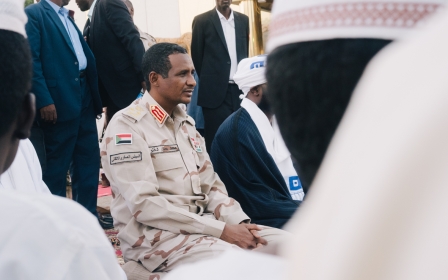How will US intervention change Sudan's transition?

The US recently appointed veteran diplomat Donald Booth as special envoy for Sudan, part of a chaotic international effort to manage the transition from former President Omar al-Bashir’s three-decade autocracy.
Booth previously held the position of US envoy to Sudan and South Sudan between 2013 and 2017, where a considerable portion of his efforts went into mending ties between Juba and Khartoum.
On the conflicts in Darfur, South Kordofan and the Blue Nile, Booth largely took a backseat to African Union mediators. Speaking to the Atlantic Council in 2014, Booth argued against “compartmentalised and regional approaches to peace-building” and in favour of a comprehensive process to address Sudan’s “fundamental issues of governance, inclusiveness, resource-sharing, identity and social equality at the national level”.
Flurry of diplomacy
Booth expressed optimism about Bashir’s “national dialogue”, ostensibly aimed at resolving these same “fundamental issues”. This fed into a reasoning that prioritised US-Sudan normalisation over regional wars and humanitarian disasters. Khartoum could be tamed into reforms, it was hoped.
Stay informed with MEE's newsletters
Sign up to get the latest alerts, insights and analysis, starting with Turkey Unpacked
Arguably, the politics of interstate relations come more naturally to a diplomat than the political economy of war in an impoverished hinterland. Booth was a Sudan desk officer at the State Department at a time before Bashir when relations between Khartoum and Washington were smooth - that is, when Sudan was a US client.
Remarkably, the lessons of the long civil war in southern Sudan did not translate for Khartoum’s political class and the diplomatic corps
Booth’s latest appointment as envoy comes amid a flurry of diplomacy in response to the 3 June massacre, when Sudanese forces brutally disbanded a sit-in around army headquarters in Khartoum.
In his judgment of Sudanese affairs, Booth seemes to shares the common views of Sudan’s cosmopolitan activists and intellectuals, and some of their myths - including a static conception of the relations between Sudan’s heartland and the war-ravaged peripheries, and the belief in a mythical core of “professional” army officers, built on the legacy of the Nimeiri era.
Outsourcing counterinsurgency
In his 2014 Atlantic Council address, Booth voiced concerns over the proliferation of paramilitary activities in Sudan’s war zones, painting them as some sort of aberration amenable to correction by a disciplined army.
What he did not seem to recognise, rather like Khartoum’s political class, was the interjection of the Rapid Support Forces (RSF) and their leader, Mohamed Hamdan Dagalo (aka Hemeti), in the dynamics of centre and periphery, and the business imperative that drives what is by all means a private militia in the economic wastelands of pastoral Sudan.
Sudan’s generals outsourced counterinsurgency in Darfur, and later in South Kordofan and the Blue Nile, to the RSF out of dire need. Without the fighting power of the RSF, the Sudanese army was in no position to face the rebels of Darfur, exhausted and demoralised as it was by a decades-long war of attrition in southern Sudan. Sudan’s army was ultimately defeated, with South Sudan gaining its independence.
Remarkably, the lessons of the long civil war in southern Sudan did not translate for Khartoum’s political class and the diplomatic corps is now in crisis mode over the country’s ambiguous transition.
If Hemeti has a predecessor, it is arguably Paulino Matip, the late commander of the South Sudan Defence Force (SSDF), which carried out Khartoum’s dirty war in the oil-rich Upper Nile of southern Sudan.
Exercises in futility
While party to the war, Matip was not party to the peace negotiations that ended it. A southern Sudanese militia that fought on the side of Khartoum did not fit into a negotiation model restricted to the two main protagonists of the war: the Sudanese government and the rebel Sudan People’s Liberation Army (SPLA). The 2006 Juba Declaration incorporated the SSDF into the SPLA, but the situation eventually morphed into a new civil war.
It was relatively easy for Khartoum to rid itself of the burden of the SSDF, thanks to the independence vote of the South Sudanese. The RSF, on the other hand, won the war in Darfur as clients of a cash-strapped Khartoum, and could not be dumped in a separate polity to sort out their affairs with former foes.
Instead, their business model flourished thanks to the Yemen war, where they were deployed as clients of the richest Gulf states, Saudi Arabia and the UAE. In the end, the militia needed to conquer Khartoum to secure the very existence of their venture. Today, the RSF leader is the deputy head of the Transitional Military Council, the ruling junta in Khartoum.
It is not clear whether Booth had the pleasure of meeting Hemeti in Khartoum, nor whether his mediation model involves the Arab Gulf patrons of the RSF. Absent these conversations, whatever abstractions may emerge along the themes of national dialogue and democratic transition are exercises in futility.
The views expressed in this article belong to the author and do not necessarily reflect the editorial policy of Middle East Eye.
Middle East Eye delivers independent and unrivalled coverage and analysis of the Middle East, North Africa and beyond. To learn more about republishing this content and the associated fees, please fill out this form. More about MEE can be found here.







